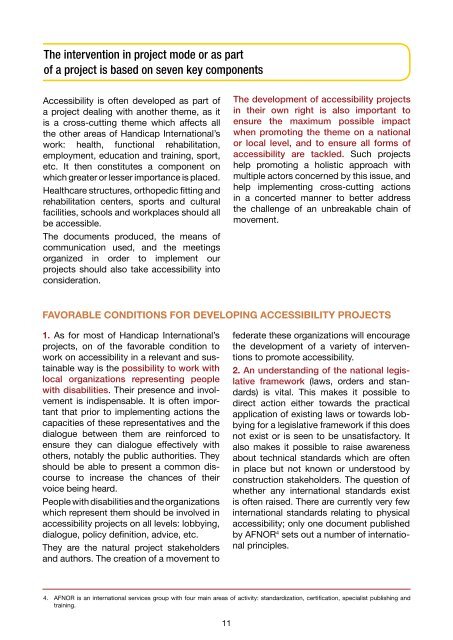Accessibility - Handicap International
Accessibility - Handicap International
Accessibility - Handicap International
Create successful ePaper yourself
Turn your PDF publications into a flip-book with our unique Google optimized e-Paper software.
The intervention in project mode or as part<br />
of a project is based on seven key components<br />
<strong>Accessibility</strong> is often developed as part of<br />
a project dealing with another theme, as it<br />
is a cross-cutting theme which affects all<br />
the other areas of <strong>Handicap</strong> <strong>International</strong>’s<br />
work: health, functional rehabilitation,<br />
employment, education and training, sport,<br />
etc. It then constitutes a component on<br />
which greater or lesser importance is placed.<br />
Healthcare structures, orthopedic fitting and<br />
rehabilitation centers, sports and cultural<br />
facilities, schools and workplaces should all<br />
be accessible.<br />
The documents produced, the means of<br />
communication used, and the meetings<br />
organized in order to implement our<br />
projects should also take accessibility into<br />
consideration.<br />
The development of accessibility projects<br />
in their own right is also important to<br />
ensure the maximum possible impact<br />
when promoting the theme on a national<br />
or local level, and to ensure all forms of<br />
accessibility are tackled. Such projects<br />
help promoting a holistic approach with<br />
multiple actors concerned by this issue, and<br />
help implementing cross-cutting actions<br />
in a concerted manner to better address<br />
the challenge of an unbreakable chain of<br />
movement.<br />
Favorable conditions for developing accessibility projects<br />
1. As for most of <strong>Handicap</strong> <strong>International</strong>’s<br />
projects, on of the favorable condition to<br />
work on accessibility in a relevant and sustainable<br />
way is the possibility to work with<br />
local organizations representing people<br />
with disabilities. Their presence and involvement<br />
is indispensable. It is often important<br />
that prior to implementing actions the<br />
capacities of these representatives and the<br />
dialogue between them are reinforced to<br />
ensure they can dialogue effectively with<br />
others, notably the public authorities. They<br />
should be able to present a common discourse<br />
to increase the chances of their<br />
voice being heard.<br />
People with disabilities and the organizations<br />
which represent them should be involved in<br />
accessibility projects on all levels: lobbying,<br />
dialogue, policy definition, advice, etc.<br />
They are the natural project stakeholders<br />
and authors. The creation of a movement to<br />
federate these organizations will encourage<br />
the development of a variety of interventions<br />
to promote accessibility.<br />
2. An understanding of the national legislative<br />
framework (laws, orders and standards)<br />
is vital. This makes it possible to<br />
direct action either towards the practical<br />
application of existing laws or towards lobbying<br />
for a legislative framework if this does<br />
not exist or is seen to be unsatisfactory. It<br />
also makes it possible to raise awareness<br />
about technical standards which are often<br />
in place but not known or understood by<br />
construction stakeholders. The question of<br />
whether any international standards exist<br />
is often raised. There are currently very few<br />
international standards relating to physical<br />
accessibility; only one document published<br />
by AFNOR 4 sets out a number of international<br />
principles.<br />
4. AFNOR is an international services group with four main areas of activity: standardization, certification, specialist publishing and<br />
training.<br />
11

















